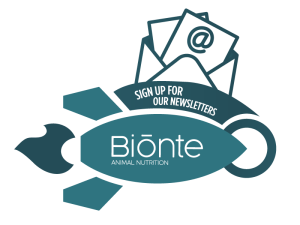The importance of water in animal nutrition
Water is the most important macronutrient for animals. It is linked to all metabolic processes, biochemical reactions, thermoregulation and waste elimination processes of the organism, among others, critically influencing the systemic health and survivability. However, water requirements depend on the productive species and on both external and intrinsic factors of the animal. On the one hand, external factors include environmental temperature, diet composition and the humidity of the ecosystem. On the other hand, key physiological factors are the productive category and the phase of the animal cycle, such as pregnancy and lactation, age and physical activity (Cherian, 2019; FAO, 2024). In addition, restricted access to water causes dehydration, causing stress to animals and consequently decreasing productivity (Landefeld et al., 2003). Therefore, it is crucial to ensure an adequate water supply to meet the needs of productive animals in each scenario.

Figure 1. Drinking water supply system in poultry farming.
Drinking water quality in animal production
The oral intake of water is the main source of this vital component for productive animals. However, drinking water might carry microbiological contaminants, parasites, excess of minerals, heavy metals, and other toxic substances, such as pesticides (Landefeld et al., 2003). Therefore, water quality directly affects animal feed intake, performance and health. For example, drinking water with high salinity (> 1,000 mg/L of soluble salts) can cause diarrhea and water rejection in animals, decreasing growth and productivity (Cherian, 2019). Another example is the proliferation of pathogenic microorganisms, such as cyanobacteria and coliforms, in drinking water systems. The exposure to microbiologically contaminated water can cause digestive disorders, liver damage, nervous system alterations, respiratory infections, and even the death of animals (Duppstadt, 2024).
In this context, pH is a quality parameter related to the mineral content in solution, which directly affects the palatability and the biosecurity of the drinking water. Briefly, pH is the measure of the alkalinity (pH > 7) and the acidity (pH < 7) of the water. Although most farms use alkaline water, a more neutral pH of 6.8 to 7.5 is generally recommended for drinking purpose. Highly alkaline water is linked to increased salinity levels, leading to digestive disorders in animals and reducing productivity (Duppstadt, 2024). In addition, neutral and slightly acidic water present a lower risk of microbiological contamination (Aconsa, 2021). Therefore, pH control on farm is a valuable tool for preserving and improving the quality of drinking water.
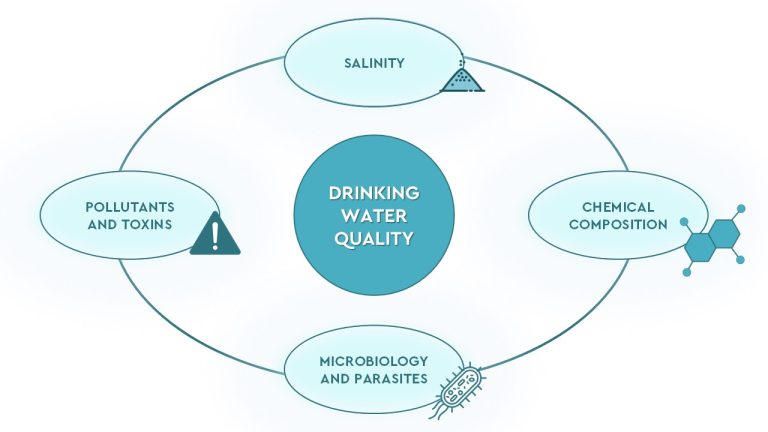
Figure 2. Main factors related to the quality of productive animals’ drinking water.
Supplementation of drinking water for animals consumption
An essential point in the control of the pH of drinking water in farms is the use of sanitizing products for water disinfection through acidification. The use of this kind of additives allows to adjust the pH to optimal ranges for animal consumption. Likewise, the use of other types of additives, such as phytogenic-based products, nutritional supplements and drugs, through drinking water is common. Administration via drinking water has the advantage of showing a faster effect than through feed intake, but entails the challenge of ensuring that the product is soluble, palatable, stable, effective and compatible with the acidifying compounds, as well as to not unbalance, but rather contribute to maintaining the optimal pH in solution (Duppstadt, 2024; Ngatho, 2024).
BIŌNTE® QUIMITŌX® LIVŌX®: powerful phytogenics for mycotoxins mitigation
BIŌNTE® QUIMITŌX® LIVŌX® has been specifically developed to address the challenges presented by mycotoxins and promote animal health in a comprehensive manner. The selected natural ingredients, such as grape extract and olive extract, have demonstrated antioxidant, anti-inflammatory and antimicrobial properties that ameliorate the detrimental effects of mycotoxins (Abdel-Moneim et al., 2020). Among its advantages, BIŌNTE® QUIMITŌX® LIVŌX® supports the maintenance of the intestinal integrity, strengthening the barrier against the entry of toxins and pathogens, and restoring the digestive functionality. Moreover, due to the high antioxidant capacity of its phytogenic components, it counteracts the oxidative stress induced by mycotoxins, thus protecting cells and tissues. It also detoxifies and protects the liver, a fundamental organ in the metabolic function (Taranu et al., 2019).
BIŌNTE® QUIMITŌX® LIVŌX® is a completely soluble and palatable solution, intended for the administration through drinking water for a rapid mitigation effect on the oxidative stress and its negative consequences on animal health under mycotoxin challenge scenarios.
BIŌNTE® QUIMITŌX® LIVŌX® improves water quality
Due to the critical relevance of pH in animal drinking water, the effect of BIŌNTE® QUIMITŌX® LIVŌX® on the acidity was studied. Most pathogenic microorganisms grow at an alkaline pH. Therefore, acidic products, such as BIŌNTE® QUIMITŌX® LIVŌX®, have a lower risk of microbiological contamination and can even present a preservative effect in matrices such as drinking water or feed (Aconsa, 2021). For this reason, an in vitro study on the capacity to modify the pH of drinking water at different dosages under controlled hardness conditions was conducted. Figure 3 shows the results of the study in which the product demonstrates the ability to reduce pH at different salinity conditions. This characteristic is of great importance, since acidic pH prevents the growth of pathogenic microorganisms and the production of mycotoxins by fungi.
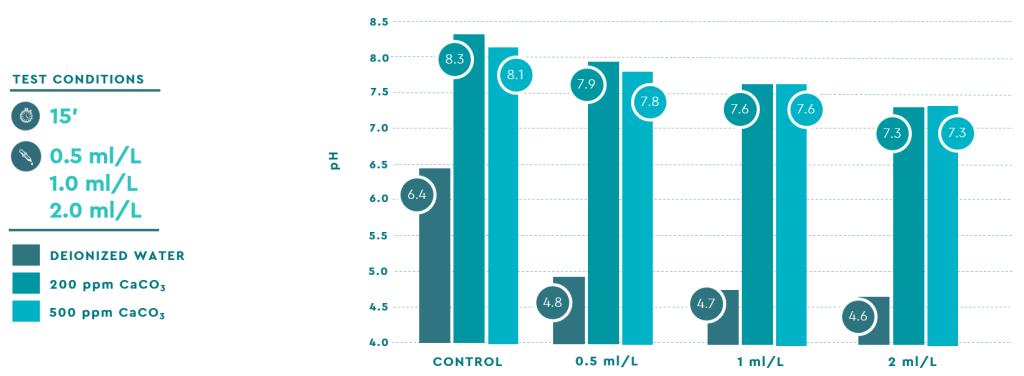
Figure 3. pH modification capacity of BIŌNTE® QUIMITŌX® LIVŌX® at different doses in drinking water of different hardness levels.
pH adjustment in international waters
In order to validate the pH improvement effect provided by BIŌNTE® QUIMITŌX® LIVŌX® observed experimentally, farm drinking water samples were taken from different regions to evaluate the effect of the product under field conditions. Water was sampled in 2024 from different regions of MEXICO, LATAM, EMEA and APAC. A large part of the field drinking water samples presented a considerable alkaline pH (pH > 8), indicating high water salinity and increased microbiological risk. In all experiments, the use of BIŌNTE® QUIMITŌX® LIVŌX® contributed to a water pH reduction of up to 7.20% at the maximum recommended dose, improving the quality of drinking water on real farms in different regions.
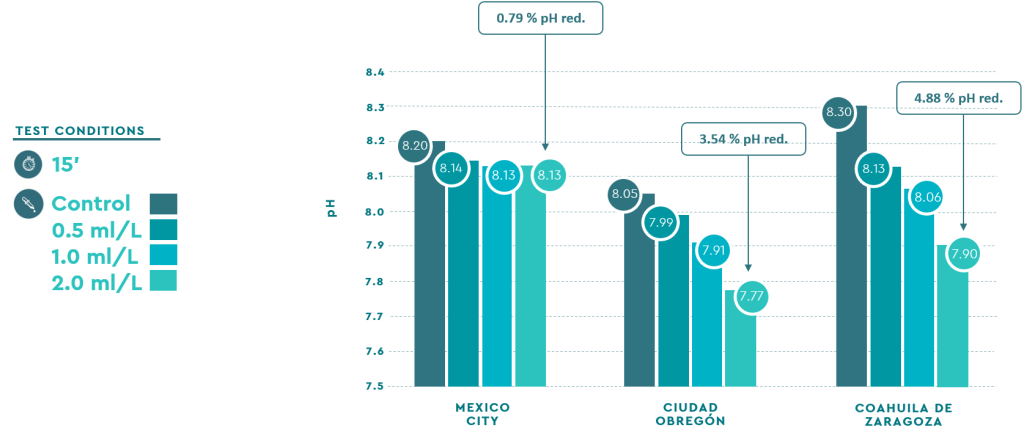
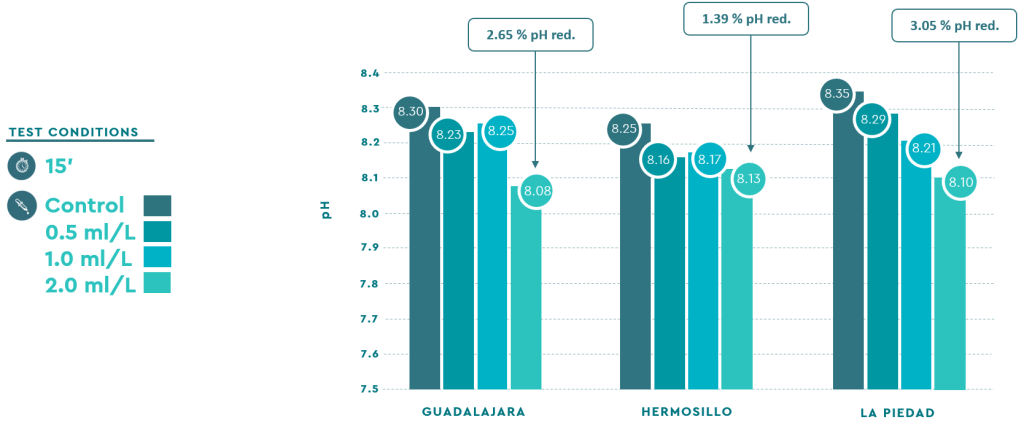
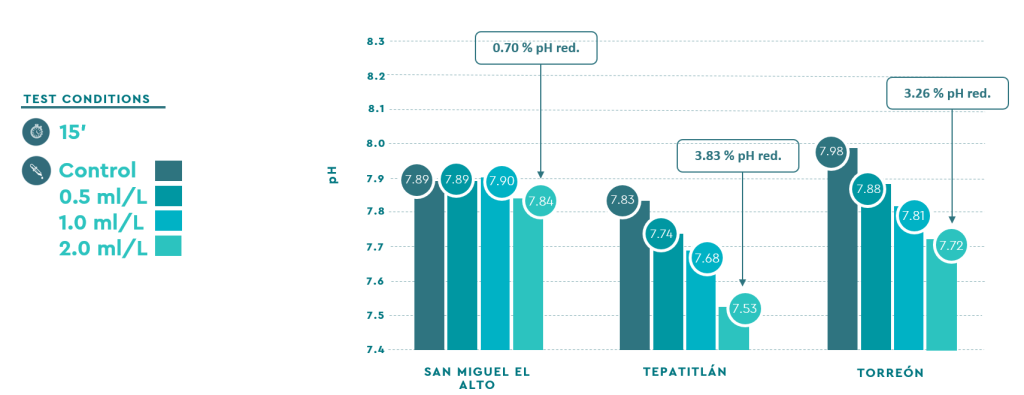
Figure 4. pH modification capacity of BIŌNTE® QUIMITŌX® LIVŌX® at different doses in drinking water from different regions of Mexico.
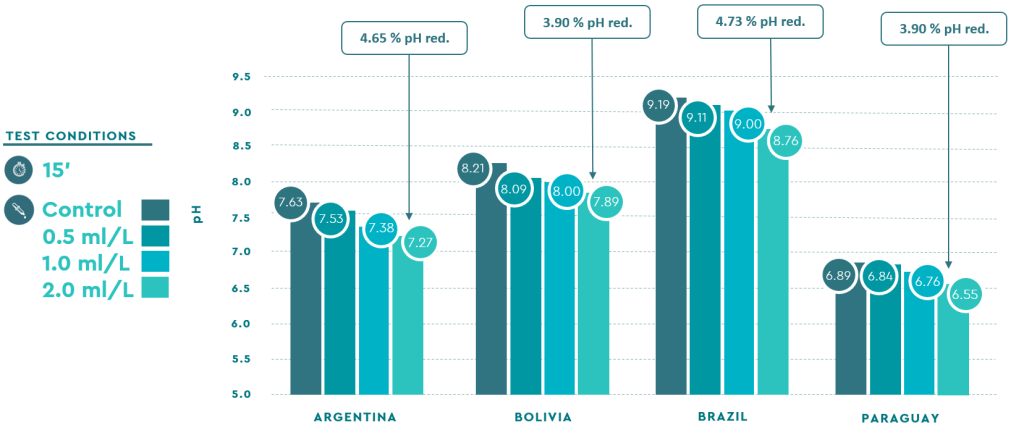
Figure 5. pH modification capacity of BIŌNTE® QUIMITŌX® LIVŌX® at different doses in drinking water from different LATAM countries.
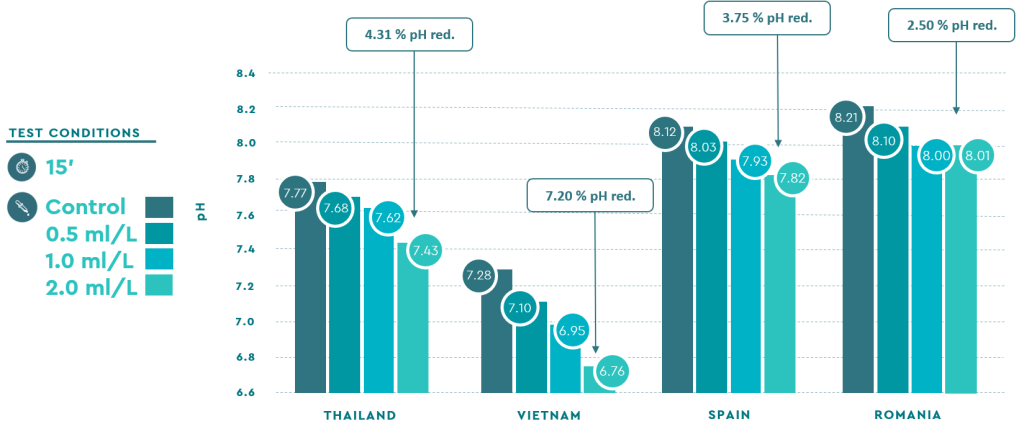
Figure 6. pH modifying capacity of BIŌNTE® QUIMITŌX® LIVŌX® at different doses in drinking water from different countries in EMEA and APAC.
Conclusions
Controlling the quality of the drinking water is essential to protect the health and performance of animal productions. In this context, adjusting the pH of drinking water by including soluble and palatable additives is a valuable tool for improving water quality by preventing microbiological contamination and reducing the incidence of digestive disorders such as diarrhea. BIŌNTE® QUIMITŌX® LIVŌX® is a solution with an innovative combination of grape and olive phytogenics to mitigate the negative effects of mycotoxins through drinking water, which demonstrated to decrease the pH of drinking water on farms in different regions, thus improving the water quality and animal welfare.

